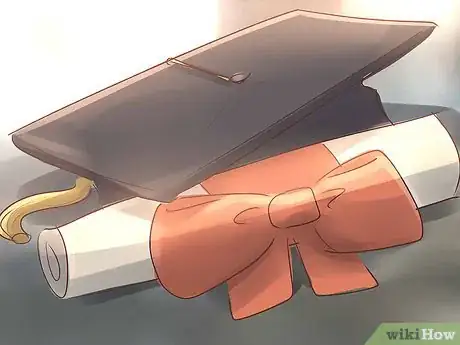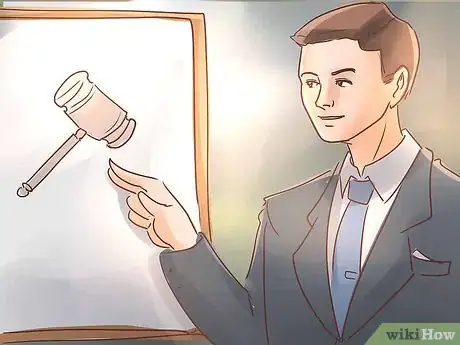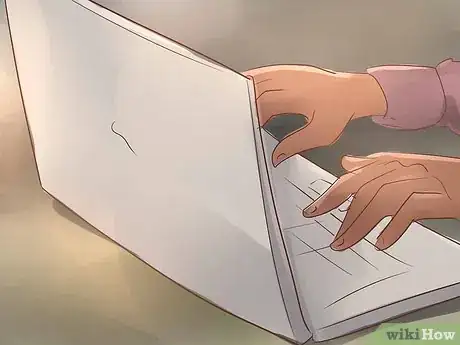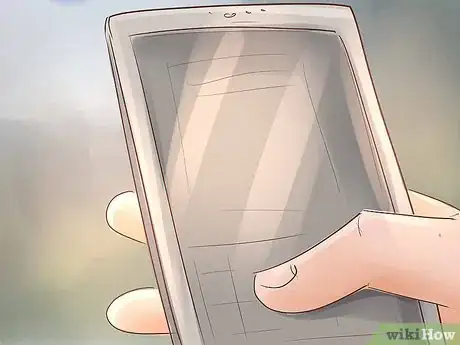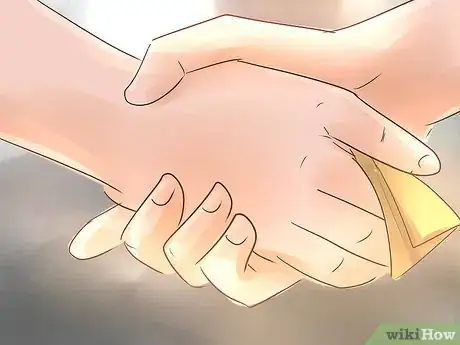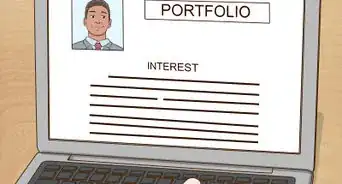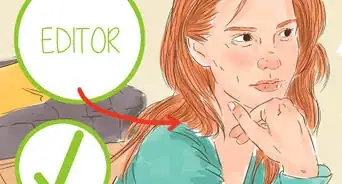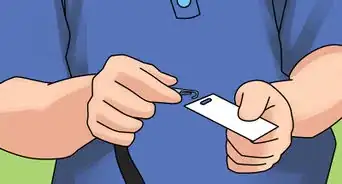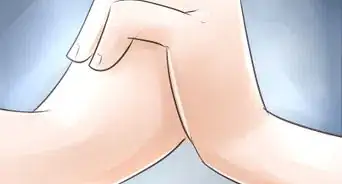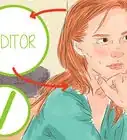This article was co-authored by Gerald Posner. Gerald Posner is an Author & Journalist based in Miami, Florida. With over 35 years of experience, he specializes in investigative journalism, nonfiction books, and editorials. He holds a law degree from UC College of the Law, San Francisco, and a BA in Political Science from the University of California-Berkeley. He’s the author of thirteen books, including several New York Times bestsellers, the winner of the Florida Book Award for General Nonfiction, and has been a finalist for the Pulitzer Prize in History. He was also shortlisted for the Best Business Book of 2020 by the Society for Advancing Business Editing and Writing.
There are 9 references cited in this article, which can be found at the bottom of the page.
This article has been viewed 45,677 times.
Legal journalists are much like journalists in general, but with a focus specifically on reporting on matters pertaining to the law. It's an especially good choice if you're interested in pursuing a career in the media after obtaining a law degree, although there are other paths to becoming a legal correspondent if you don't have a legal degree. Keep reading for more tips on how to get started in a media law career!
Steps
Getting the Right Education
-
1Get an undergraduate degree in journalism. While a degree in journalism is not required in order to become a successful journalist, pursuing journalism as an undergraduate degree can make your entry into the journalism profession easier. Some journalists can be successful without having earned a degree in journalism; though this is the case, having such a degree may facilitate a successful career.[1]
- Consider doing a double major in journalism and another field if your university offers such a double major. Consider choosing something “wildly different” from journalism in order to diversify yourself.[2] For aspiring legal journalists, the most appropriate second major would be a law-related field.
- If you are studying at a university that offers law as an undergraduate degree (e.g. most universities in Australia, New Zealand, and the United Kingdom), then pursue law and journalism as dual degrees if offered by your university.
- If you are studying at a university in the United States, where law is a graduate level degree, then consider doing a ‘pre-law’ or ‘legal studies’ program if your university offers one along with your journalism degree. Note that while some believe that pre-law programs are not the best preparation for law school,[3] you may not necessarily be intending to go to law school, and doing a pre-law program may be a good way to complement your journalism degree on your way to becoming a legal journalist.
-
2Attend law school. Consider going to law school if you want to be a legal journalist. Again, you do not need a law degree to become a legal journalist but having one can certainly help. Journalism requires coming up with new ideas, synthesizing existing ideas, and communicating those ideas effectively verbally and in writing. A degree in law can be excellent preparation for acquiring those skills.[4] Importantly, if your goal is to be a legal journalist, then having specialist legal knowledge acquired in law school can help you immensely. There are numerous examples of well known journalists, such as Jeff Greenfield, Geraldo Rivera, and Cynthia McFadden, who attended law school before embarking on a career in legal journalism.[5]
- If you are studying law as an undergraduate degree, as most people do in Australia, India, New Zealand, and the United Kingdom, then doing your undergraduate degree in law can also lead to a career in legal journalism. The Solicitor’s Journal’s Emily Bater, for example, studied law as an undergraduate degree at Cardiff University and chose a career in legal journalism without having studied journalism.[6]
- Attending law school in the United States first requires completing an undergraduate degree. This degree can be in any field. You may choose not to study journalism as an undergraduate and then attend law school and still become a legal journalist.
- Note that attending law school in the United States is particularly costly, and the most well-paid jobs after law school tend to be in legal practice rather than journalism. You may not necessarily earn a salary commensurate with the market value of your law degree if you choose a career outside legal practice. It is perhaps for this reason that journalism, for law graduates, is an “alternative” career.[7]
- Some U.S. law schools offer joint degree programs in journalism with their law degree. UC Berkeley, for example, offers a masters degree in journalism as a joint degree along with its law degree. Check if your law school offers a joint degree with the journalism school at your university.
Advertisement -
3Attend graduate school. You may not have a background in either law or journalism and do not wish to attend law school. If so, consider doing a master’s degree in journalism or legal studies (or both). These are not required to become a legal journalist but can help you in much the same way that a law degree or an undergraduate journalism degree can in becoming a legal journalist.
- Yale, for example, offers a Master of Studies in Law program for non-lawyers who wish “to obtain a basic familiarity with legal thought and to explore the relation of law to their disciplines.”[8]
- Many of the leading journalism schools across universities in the U.S. offer graduate degrees in journalism. Note that graduate school in journalism can be expensive,[9] so consider carefully whether you need a graduate degree to achieve your ultimate goal of becoming a legal journalist.
-
4Enroll in a continuing education or certificate program. If you are at a stage in your career where attending school full-time is not an option, you may consider the option of taking a continuing education course in law or journalism (or both) on a part-time basis or enrolling in a certificate program or other non-degree program. Although these are not required in order to become a legal journalist, they offer a cost-effective and accelerated route to acquiring the education that can help you become a legal journalist.
- Loyola Law School, for example, offers a three-day fellowship known as “Journalist Law School” to enable journalists with at least three years of journalism experience to learn about reporting on legal matters without a law degree. At the end of the fellowship, fellows receive a certificate of completion.
- If you do not have a background in journalism, you may boost your resume by enrolling in a continuing education program in journalism. Doing so can give you an insight into the field of journalism that may be useful if you do not have a journalism background. Columbia University, for example, offers a variety of continuing education programs in journalism.
Gaining the Right Experience
-
1Start off with an internship. While you can certainly make a mid-career switch to journalism, starting early would be a better idea because “the earlier you start and succeed, the higher you’re likely to rise.”[10] For an aspiring legal journalist, this means getting an internship that offers legal journalism experience early on in your career if possible. Getting an internship is also a good way to build a portfolio, meet people in the field, and make contacts, all of which could prove significant for finding permanent employment.[11] Some of these internships may be unpaid, so you have to be willing to do them for the experience alone.
-
2Do freelancing work. Consider doing freelancing work, which should help you hone your writing and research skills and provide evidence of journalism experience on your resume. This could mean, for example, writing for your school paper while you are in college.[12]
-
3Read the work of other legal journalists. Reading the work of experienced legal journalists should help you understand what type of work you are expected to produce. This should also help you stay abreast with current legal events, which should in turn help you contribute to the debate surrounding the particular issue you are reading about if you are currently working as a journalist or writing a legal blog.
-
4Find work as a legal contributor or analyst. If you are an established authority in the legal field or have extensive legal knowledge and experience, you may be able to find work as a legal analyst for a television news network or be able to write articles as a legal contributor for print media. This type of work may lead to a full-time position as a legal journalist, but you may not be looking to become a full-time legal journalist after all. Working as a part-time legal analyst or contributor for a news source may be exactly what you want and will offer you valuable legal journalism experience. Note that for this type of job, your views would be sought after because of the expert legal knowledge that you would bring to bear on a news report, so having such knowledge would be crucial to landing a position of this sort.
-
5Write a blog on legal issues. In recent years, blogging has become a method of disseminating one’s ideas online to a wide audience in a quick and cost-efficient manner. Blogging may not be regarded as the same as journalism by some commentators, but blogging is also regarded by others as a useful training ground for journalists, and some commentators do not regard the differences between the two as significant.[13] Begin writing a blog on legal matters, and your ideas may reach a wide audience fairly easily and efficiently. Make sure the content of your blog is professional and thoroughly researched so that you make an impact on your audience through the quality of your work.
Knowing the Right People
-
1Build relationships. Journalism, in many ways, is “a relationship business.”[14] Invest time in building relationships with mentors and colleagues, who may help you down the line in finding work as a legal journalist.
-
2Stay in touch with classmates. Keep in touch with your peers with whom you attended college or law school. If you studied journalism as an undergraduate, many of your peers may be working in the journalism industry and may help you find work.[15] Alternatively, you may have attended law school with someone who is now working as a legal journalist, and maintaining contact with that individual can also lead to a job.
-
3Stay in touch with your journalism professors. If you studied journalism at university, maintain contact with your journalism professors after you graduate. Many of them work in the industry and can help you find a job or put you in touch with the right people.[16]
-
4Learn to build relationships with sources. In addition to helping you find a job, it is also important to know how to foster relationships with your human sources once you are actually working as a journalist. Journalism is about relating stories to the world, and often the most appealing source of information for a journalist is a human source. Having a good relationship with your sources “make you better at your job.”[17]
-
5Build and maintain an online presence. Use social media (Facebook, Twitter, etc.) to disseminate your work and maintain a professional online presence. If you write a legal blog, you can share links to your blog through your Twitter and Facebook pages. Having an online presence helps you reach out to others who are well-established in the field, and they may be in the position to offer you a job if you impress them with your work.
-
6Seek the advice of experienced legal journalists. Every legal journalist is bound to have a unique story, so try seeking the advice of someone you know who works in the journalism industry. This may offer you an insight into how to enter the legal journalism profession. If someone you know personally does not work in the industry, reach out by email or social media to well known legal journalists, whose email and social media account information is generally readily available on the web. Most of them should be happy to offer advice to someone aspiring to follow the same career path as them.
Choosing Your Work Schedule
-
1Choose a work schedule. Journalism offers opportunities to work on a variety of work schedules. If you already have the credentials to be a legal journalist, decide whether you want to work full-time or part-time as an employee of a media organization or only do freelancing work as and when your schedule permits.
-
2Begin by working part-time. You may be a practicing lawyer who wants to keep your full-time job and be a legal journalist only on a part-time basis. If you are a legal academic, you may want to keep your full-time job while appearing on Television or writing in print media on news stories that require your legal expertise on a part-time basis. Beginning as a part-time legal journalist can help you acquire a flavor of the industry and decide if legal journalism is the right job for you while continuing to work in your existing career.
-
3Transition into full-time work. If you like the idea of being a full-time legal journalist after having gained exposure to the industry on a part-time basis, apply for full-time positions. An example of a well-known journalist who made the transition from being a practicing lawyer to a full-time journalist for Salon.com and the Guardian newspaper is Glenn Greenwald.[18]
- You can find job listings for both full-time and freelancing work in journalism by clicking here.
- You should also use the connections made with former professors and others within the industry to find jobs that are not necessarily listed on the internet.
Expert Q&A
-
QuestionIs legal journalism a good career path?
 Gerald PosnerGerald Posner is an Author & Journalist based in Miami, Florida. With over 35 years of experience, he specializes in investigative journalism, nonfiction books, and editorials. He holds a law degree from UC College of the Law, San Francisco, and a BA in Political Science from the University of California-Berkeley. He’s the author of thirteen books, including several New York Times bestsellers, the winner of the Florida Book Award for General Nonfiction, and has been a finalist for the Pulitzer Prize in History. He was also shortlisted for the Best Business Book of 2020 by the Society for Advancing Business Editing and Writing.
Gerald PosnerGerald Posner is an Author & Journalist based in Miami, Florida. With over 35 years of experience, he specializes in investigative journalism, nonfiction books, and editorials. He holds a law degree from UC College of the Law, San Francisco, and a BA in Political Science from the University of California-Berkeley. He’s the author of thirteen books, including several New York Times bestsellers, the winner of the Florida Book Award for General Nonfiction, and has been a finalist for the Pulitzer Prize in History. He was also shortlisted for the Best Business Book of 2020 by the Society for Advancing Business Editing and Writing.
Author & Journalist Definitely! This is a great time for somebody looking to be a legal journalist, because there's an absolute explosion of online resources that need work all of the time. The United States is becoming very litigious (since lawsuits are being filed on just about everything), so it helps to understand how the legal system works.
Definitely! This is a great time for somebody looking to be a legal journalist, because there's an absolute explosion of online resources that need work all of the time. The United States is becoming very litigious (since lawsuits are being filed on just about everything), so it helps to understand how the legal system works.
Expert Interview
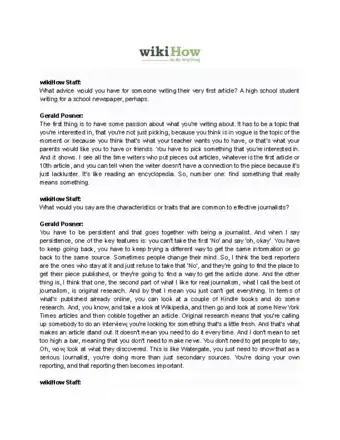
Thanks for reading our article! If you'd like to learn more about becoming a legal journalist, check out our in-depth interview with Gerald Posner.
References
- ↑ http://www.forbes.com/sites/jennagoudreau/2012/11/09/top-10-tips-for-young-aspiring-journalists/
- ↑ http://www.forbes.com/sites/jennagoudreau/2012/11/09/top-10-tips-for-young-aspiring-journalists/
- ↑ http://www.usnews.com/education/best-graduate-schools/top-law-schools/articles/2012/10/29/future-law-students-should-avoid-prelaw-majors-some-say
- ↑ http://www.usnews.com/education/blogs/law-admissions-lowdown/2012/01/23/5-unique-career-paths-for-law-school-grads
- ↑ http://www.usnews.com/education/blogs/law-admissions-lowdown/2012/01/23/5-unique-career-paths-for-law-school-grads
- ↑ http://www.law.ac.uk/futurelawyers/legal-journalism/
- ↑ http://www.law.ac.uk/futurelawyers/legal-journalism/
- ↑ http://www.law.yale.edu/graduate/msl_program.htm
- ↑ http://www.huffingtonpost.com/justin-cox/is-journalism-grad-school_b_839356.html
- ↑ http://www.forbes.com/sites/jennagoudreau/2012/11/09/top-10-tips-for-young-aspiring-journalists/
- ↑ http://www.forbes.com/sites/jennagoudreau/2012/11/09/top-10-tips-for-young-aspiring-journalists/
- ↑ http://www.forbes.com/sites/jennagoudreau/2012/11/09/top-10-tips-for-young-aspiring-journalists/
- ↑ http://thenextweb.com/us/2010/08/18/blogging-vs-journalism-the-ongoing-debate/
- ↑ http://www.forbes.com/sites/jennagoudreau/2012/11/09/top-10-tips-for-young-aspiring-journalists/2/
- ↑ http://www.forbes.com/sites/jennagoudreau/2012/11/09/top-10-tips-for-young-aspiring-journalists/2/
- ↑ http://www.forbes.com/sites/jennagoudreau/2012/11/09/top-10-tips-for-young-aspiring-journalists/2/
- ↑ http://www.forbes.com/sites/jennagoudreau/2012/11/09/top-10-tips-for-young-aspiring-journalists/2/
- ↑ http://www.theguardian.com/profile/glenn-greenwald
